Freud's Psychoanalytical Theory and Sexual Need
VerifiedAdded on 2020/10/22
|8
|2514
|332
AI Summary
This assignment explores the psychoanalytical theories of Sigmund Freud, focusing on his ideas about sexual need and its fulfillment. The discussion delves into how Freud's theories can explain human behavior and psychological development, including the concept of the Wolf Man and its connection to phobia and anxiety. The analysis also touches on the topic of domination in relationships and how it relates to Freud's psychoanalytic theory.
Contribute Materials
Your contribution can guide someone’s learning journey. Share your
documents today.
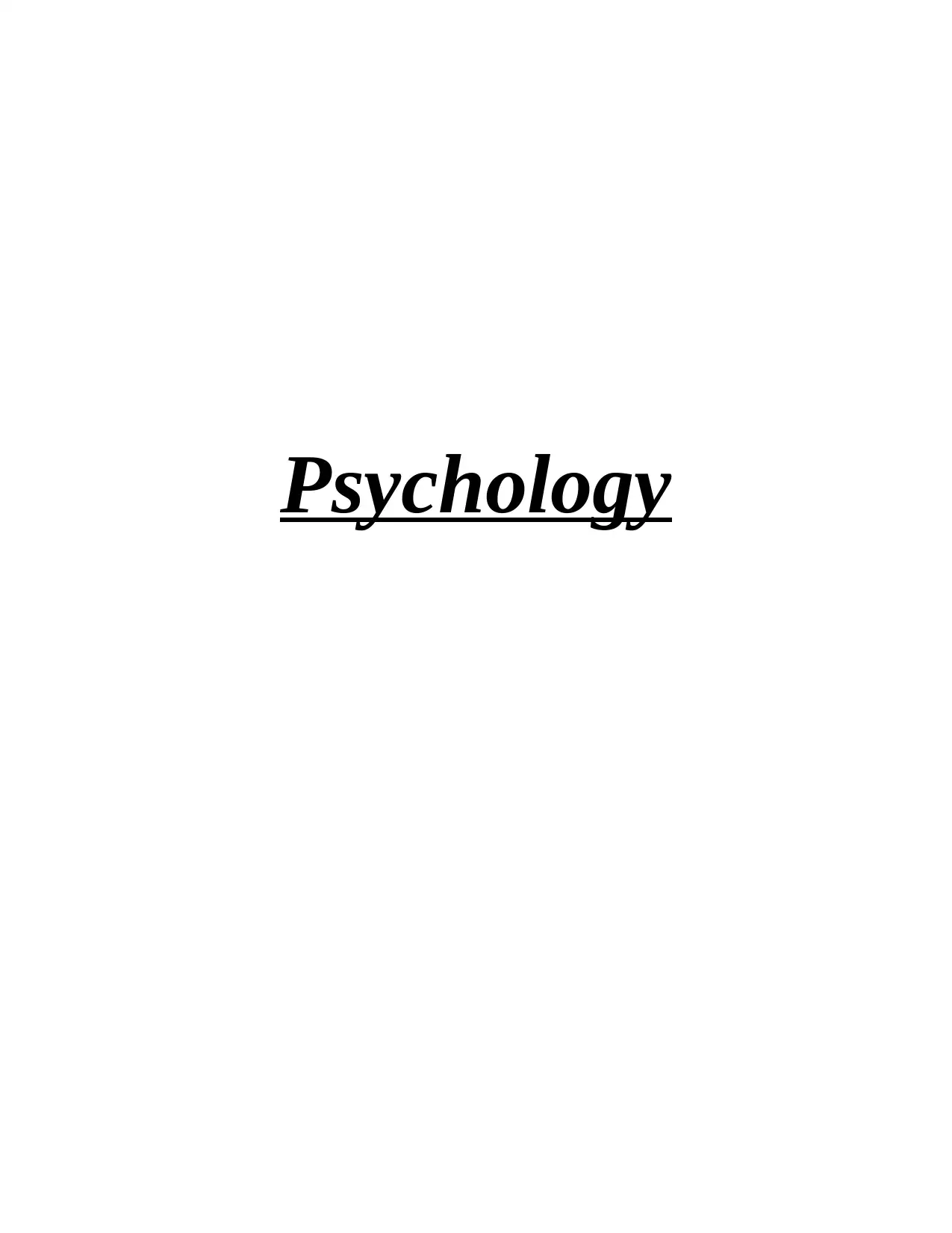
Psychology
Secure Best Marks with AI Grader
Need help grading? Try our AI Grader for instant feedback on your assignments.

Table of Contents
INTRODUCTION...........................................................................................................................1
MAIN BODY...................................................................................................................................1
CONCLUSION................................................................................................................................3
REFRENCES...................................................................................................................................4
.........................................................................................................................................................4
INTRODUCTION...........................................................................................................................1
MAIN BODY...................................................................................................................................1
CONCLUSION................................................................................................................................3
REFRENCES...................................................................................................................................4
.........................................................................................................................................................4
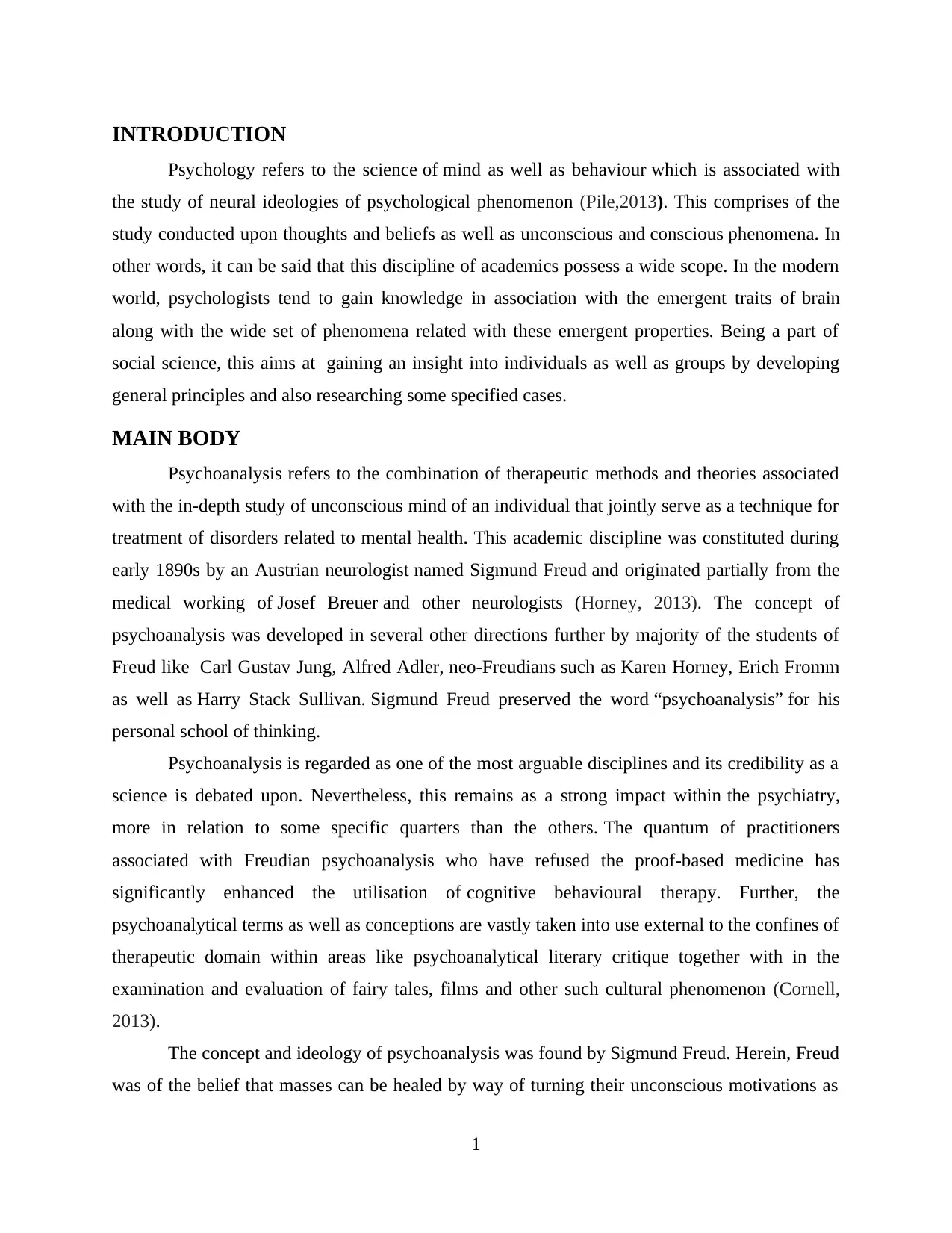
INTRODUCTION
Psychology refers to the science of mind as well as behaviour which is associated with
the study of neural ideologies of psychological phenomenon (Pile,2013). This comprises of the
study conducted upon thoughts and beliefs as well as unconscious and conscious phenomena. In
other words, it can be said that this discipline of academics possess a wide scope. In the modern
world, psychologists tend to gain knowledge in association with the emergent traits of brain
along with the wide set of phenomena related with these emergent properties. Being a part of
social science, this aims at gaining an insight into individuals as well as groups by developing
general principles and also researching some specified cases.
MAIN BODY
Psychoanalysis refers to the combination of therapeutic methods and theories associated
with the in-depth study of unconscious mind of an individual that jointly serve as a technique for
treatment of disorders related to mental health. This academic discipline was constituted during
early 1890s by an Austrian neurologist named Sigmund Freud and originated partially from the
medical working of Josef Breuer and other neurologists (Horney, 2013). The concept of
psychoanalysis was developed in several other directions further by majority of the students of
Freud like Carl Gustav Jung, Alfred Adler, neo-Freudians such as Karen Horney, Erich Fromm
as well as Harry Stack Sullivan. Sigmund Freud preserved the word “psychoanalysis” for his
personal school of thinking.
Psychoanalysis is regarded as one of the most arguable disciplines and its credibility as a
science is debated upon. Nevertheless, this remains as a strong impact within the psychiatry,
more in relation to some specific quarters than the others. The quantum of practitioners
associated with Freudian psychoanalysis who have refused the proof-based medicine has
significantly enhanced the utilisation of cognitive behavioural therapy. Further, the
psychoanalytical terms as well as conceptions are vastly taken into use external to the confines of
therapeutic domain within areas like psychoanalytical literary critique together with in the
examination and evaluation of fairy tales, films and other such cultural phenomenon (Cornell,
2013).
The concept and ideology of psychoanalysis was found by Sigmund Freud. Herein, Freud
was of the belief that masses can be healed by way of turning their unconscious motivations as
1
Psychology refers to the science of mind as well as behaviour which is associated with
the study of neural ideologies of psychological phenomenon (Pile,2013). This comprises of the
study conducted upon thoughts and beliefs as well as unconscious and conscious phenomena. In
other words, it can be said that this discipline of academics possess a wide scope. In the modern
world, psychologists tend to gain knowledge in association with the emergent traits of brain
along with the wide set of phenomena related with these emergent properties. Being a part of
social science, this aims at gaining an insight into individuals as well as groups by developing
general principles and also researching some specified cases.
MAIN BODY
Psychoanalysis refers to the combination of therapeutic methods and theories associated
with the in-depth study of unconscious mind of an individual that jointly serve as a technique for
treatment of disorders related to mental health. This academic discipline was constituted during
early 1890s by an Austrian neurologist named Sigmund Freud and originated partially from the
medical working of Josef Breuer and other neurologists (Horney, 2013). The concept of
psychoanalysis was developed in several other directions further by majority of the students of
Freud like Carl Gustav Jung, Alfred Adler, neo-Freudians such as Karen Horney, Erich Fromm
as well as Harry Stack Sullivan. Sigmund Freud preserved the word “psychoanalysis” for his
personal school of thinking.
Psychoanalysis is regarded as one of the most arguable disciplines and its credibility as a
science is debated upon. Nevertheless, this remains as a strong impact within the psychiatry,
more in relation to some specific quarters than the others. The quantum of practitioners
associated with Freudian psychoanalysis who have refused the proof-based medicine has
significantly enhanced the utilisation of cognitive behavioural therapy. Further, the
psychoanalytical terms as well as conceptions are vastly taken into use external to the confines of
therapeutic domain within areas like psychoanalytical literary critique together with in the
examination and evaluation of fairy tales, films and other such cultural phenomenon (Cornell,
2013).
The concept and ideology of psychoanalysis was found by Sigmund Freud. Herein, Freud
was of the belief that masses can be healed by way of turning their unconscious motivations as
1
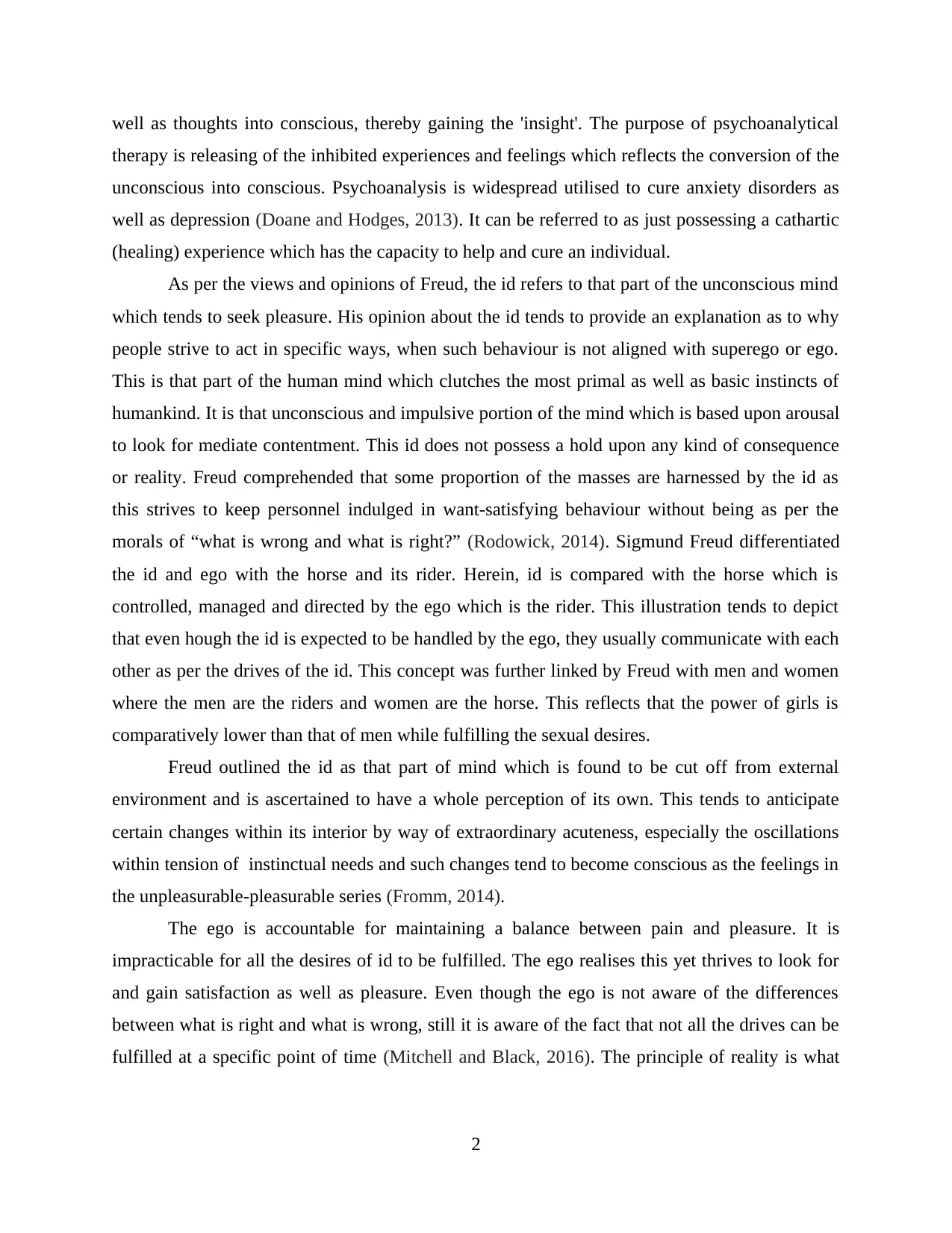
well as thoughts into conscious, thereby gaining the 'insight'. The purpose of psychoanalytical
therapy is releasing of the inhibited experiences and feelings which reflects the conversion of the
unconscious into conscious. Psychoanalysis is widespread utilised to cure anxiety disorders as
well as depression (Doane and Hodges, 2013). It can be referred to as just possessing a cathartic
(healing) experience which has the capacity to help and cure an individual.
As per the views and opinions of Freud, the id refers to that part of the unconscious mind
which tends to seek pleasure. His opinion about the id tends to provide an explanation as to why
people strive to act in specific ways, when such behaviour is not aligned with superego or ego.
This is that part of the human mind which clutches the most primal as well as basic instincts of
humankind. It is that unconscious and impulsive portion of the mind which is based upon arousal
to look for mediate contentment. This id does not possess a hold upon any kind of consequence
or reality. Freud comprehended that some proportion of the masses are harnessed by the id as
this strives to keep personnel indulged in want-satisfying behaviour without being as per the
morals of “what is wrong and what is right?” (Rodowick, 2014). Sigmund Freud differentiated
the id and ego with the horse and its rider. Herein, id is compared with the horse which is
controlled, managed and directed by the ego which is the rider. This illustration tends to depict
that even hough the id is expected to be handled by the ego, they usually communicate with each
other as per the drives of the id. This concept was further linked by Freud with men and women
where the men are the riders and women are the horse. This reflects that the power of girls is
comparatively lower than that of men while fulfilling the sexual desires.
Freud outlined the id as that part of mind which is found to be cut off from external
environment and is ascertained to have a whole perception of its own. This tends to anticipate
certain changes within its interior by way of extraordinary acuteness, especially the oscillations
within tension of instinctual needs and such changes tend to become conscious as the feelings in
the unpleasurable-pleasurable series (Fromm, 2014).
The ego is accountable for maintaining a balance between pain and pleasure. It is
impracticable for all the desires of id to be fulfilled. The ego realises this yet thrives to look for
and gain satisfaction as well as pleasure. Even though the ego is not aware of the differences
between what is right and what is wrong, still it is aware of the fact that not all the drives can be
fulfilled at a specific point of time (Mitchell and Black, 2016). The principle of reality is what
2
therapy is releasing of the inhibited experiences and feelings which reflects the conversion of the
unconscious into conscious. Psychoanalysis is widespread utilised to cure anxiety disorders as
well as depression (Doane and Hodges, 2013). It can be referred to as just possessing a cathartic
(healing) experience which has the capacity to help and cure an individual.
As per the views and opinions of Freud, the id refers to that part of the unconscious mind
which tends to seek pleasure. His opinion about the id tends to provide an explanation as to why
people strive to act in specific ways, when such behaviour is not aligned with superego or ego.
This is that part of the human mind which clutches the most primal as well as basic instincts of
humankind. It is that unconscious and impulsive portion of the mind which is based upon arousal
to look for mediate contentment. This id does not possess a hold upon any kind of consequence
or reality. Freud comprehended that some proportion of the masses are harnessed by the id as
this strives to keep personnel indulged in want-satisfying behaviour without being as per the
morals of “what is wrong and what is right?” (Rodowick, 2014). Sigmund Freud differentiated
the id and ego with the horse and its rider. Herein, id is compared with the horse which is
controlled, managed and directed by the ego which is the rider. This illustration tends to depict
that even hough the id is expected to be handled by the ego, they usually communicate with each
other as per the drives of the id. This concept was further linked by Freud with men and women
where the men are the riders and women are the horse. This reflects that the power of girls is
comparatively lower than that of men while fulfilling the sexual desires.
Freud outlined the id as that part of mind which is found to be cut off from external
environment and is ascertained to have a whole perception of its own. This tends to anticipate
certain changes within its interior by way of extraordinary acuteness, especially the oscillations
within tension of instinctual needs and such changes tend to become conscious as the feelings in
the unpleasurable-pleasurable series (Fromm, 2014).
The ego is accountable for maintaining a balance between pain and pleasure. It is
impracticable for all the desires of id to be fulfilled. The ego realises this yet thrives to look for
and gain satisfaction as well as pleasure. Even though the ego is not aware of the differences
between what is right and what is wrong, still it is aware of the fact that not all the drives can be
fulfilled at a specific point of time (Mitchell and Black, 2016). The principle of reality is what
2
Secure Best Marks with AI Grader
Need help grading? Try our AI Grader for instant feedback on your assignments.
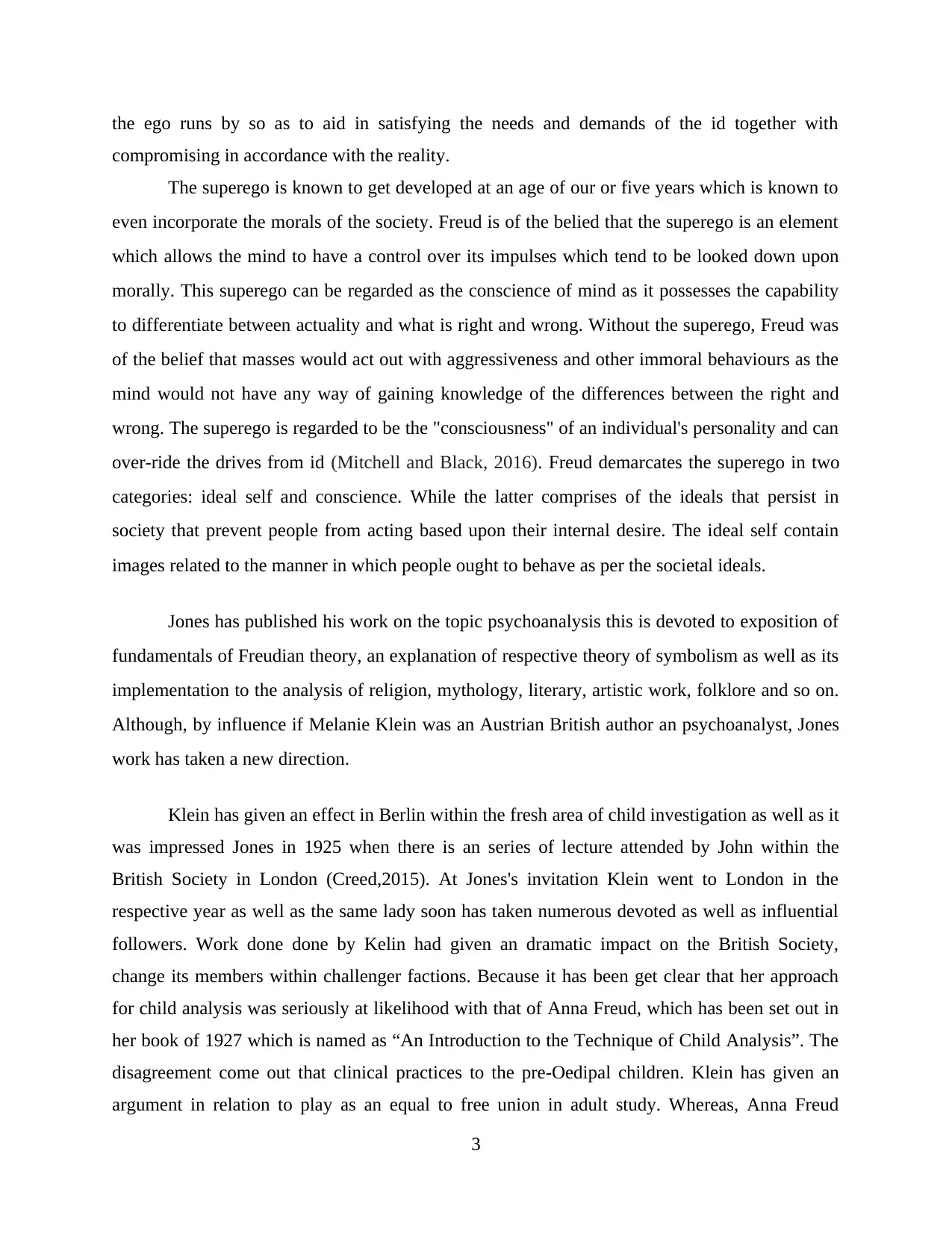
the ego runs by so as to aid in satisfying the needs and demands of the id together with
compromising in accordance with the reality.
The superego is known to get developed at an age of our or five years which is known to
even incorporate the morals of the society. Freud is of the belied that the superego is an element
which allows the mind to have a control over its impulses which tend to be looked down upon
morally. This superego can be regarded as the conscience of mind as it possesses the capability
to differentiate between actuality and what is right and wrong. Without the superego, Freud was
of the belief that masses would act out with aggressiveness and other immoral behaviours as the
mind would not have any way of gaining knowledge of the differences between the right and
wrong. The superego is regarded to be the "consciousness" of an individual's personality and can
over-ride the drives from id (Mitchell and Black, 2016). Freud demarcates the superego in two
categories: ideal self and conscience. While the latter comprises of the ideals that persist in
society that prevent people from acting based upon their internal desire. The ideal self contain
images related to the manner in which people ought to behave as per the societal ideals.
Jones has published his work on the topic psychoanalysis this is devoted to exposition of
fundamentals of Freudian theory, an explanation of respective theory of symbolism as well as its
implementation to the analysis of religion, mythology, literary, artistic work, folklore and so on.
Although, by influence if Melanie Klein was an Austrian British author an psychoanalyst, Jones
work has taken a new direction.
Klein has given an effect in Berlin within the fresh area of child investigation as well as it
was impressed Jones in 1925 when there is an series of lecture attended by John within the
British Society in London (Creed,2015). At Jones's invitation Klein went to London in the
respective year as well as the same lady soon has taken numerous devoted as well as influential
followers. Work done done by Kelin had given an dramatic impact on the British Society,
change its members within challenger factions. Because it has been get clear that her approach
for child analysis was seriously at likelihood with that of Anna Freud, which has been set out in
her book of 1927 which is named as “An Introduction to the Technique of Child Analysis”. The
disagreement come out that clinical practices to the pre-Oedipal children. Klein has given an
argument in relation to play as an equal to free union in adult study. Whereas, Anna Freud
3
compromising in accordance with the reality.
The superego is known to get developed at an age of our or five years which is known to
even incorporate the morals of the society. Freud is of the belied that the superego is an element
which allows the mind to have a control over its impulses which tend to be looked down upon
morally. This superego can be regarded as the conscience of mind as it possesses the capability
to differentiate between actuality and what is right and wrong. Without the superego, Freud was
of the belief that masses would act out with aggressiveness and other immoral behaviours as the
mind would not have any way of gaining knowledge of the differences between the right and
wrong. The superego is regarded to be the "consciousness" of an individual's personality and can
over-ride the drives from id (Mitchell and Black, 2016). Freud demarcates the superego in two
categories: ideal self and conscience. While the latter comprises of the ideals that persist in
society that prevent people from acting based upon their internal desire. The ideal self contain
images related to the manner in which people ought to behave as per the societal ideals.
Jones has published his work on the topic psychoanalysis this is devoted to exposition of
fundamentals of Freudian theory, an explanation of respective theory of symbolism as well as its
implementation to the analysis of religion, mythology, literary, artistic work, folklore and so on.
Although, by influence if Melanie Klein was an Austrian British author an psychoanalyst, Jones
work has taken a new direction.
Klein has given an effect in Berlin within the fresh area of child investigation as well as it
was impressed Jones in 1925 when there is an series of lecture attended by John within the
British Society in London (Creed,2015). At Jones's invitation Klein went to London in the
respective year as well as the same lady soon has taken numerous devoted as well as influential
followers. Work done done by Kelin had given an dramatic impact on the British Society,
change its members within challenger factions. Because it has been get clear that her approach
for child analysis was seriously at likelihood with that of Anna Freud, which has been set out in
her book of 1927 which is named as “An Introduction to the Technique of Child Analysis”. The
disagreement come out that clinical practices to the pre-Oedipal children. Klein has given an
argument in relation to play as an equal to free union in adult study. Whereas, Anna Freud
3
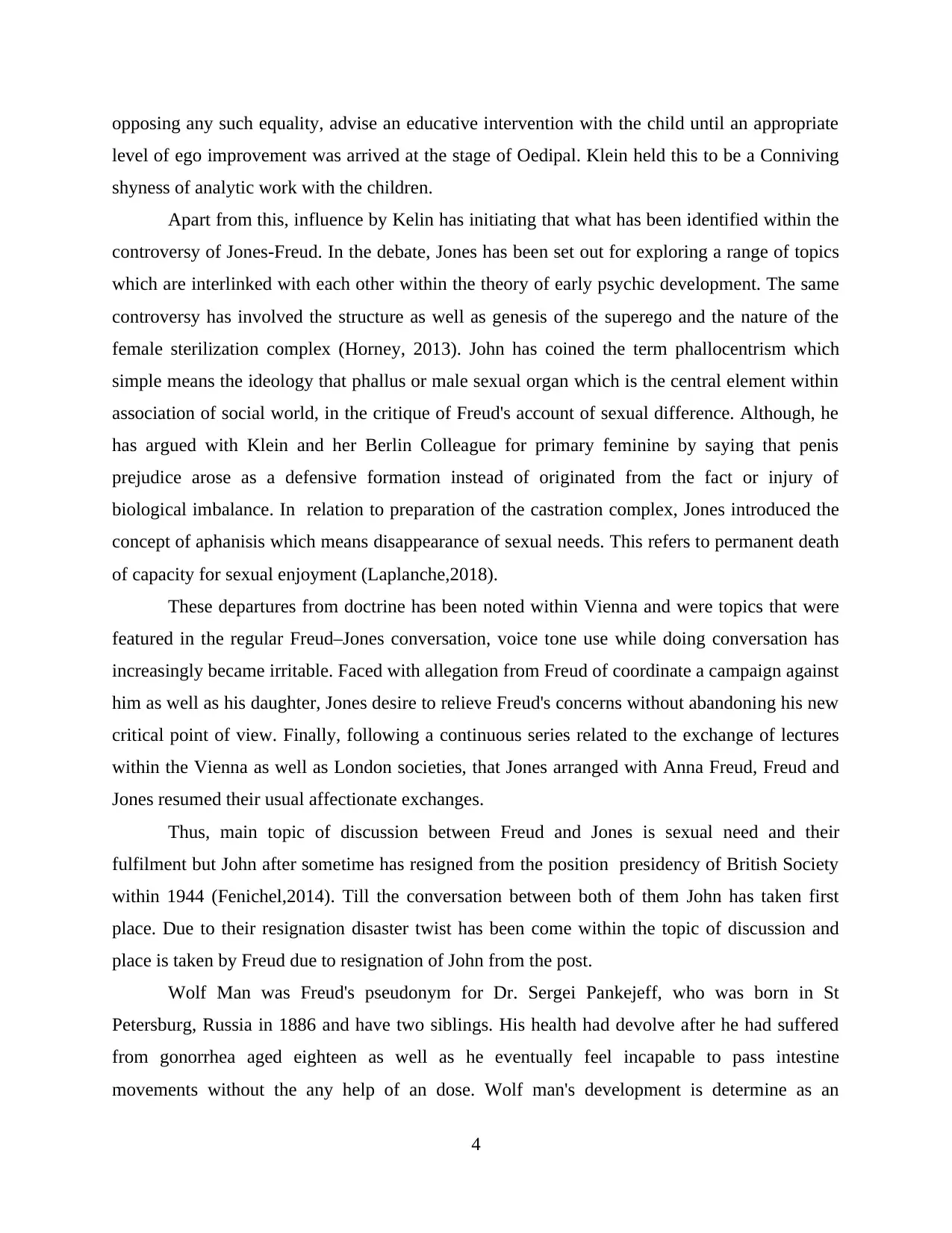
opposing any such equality, advise an educative intervention with the child until an appropriate
level of ego improvement was arrived at the stage of Oedipal. Klein held this to be a Conniving
shyness of analytic work with the children.
Apart from this, influence by Kelin has initiating that what has been identified within the
controversy of Jones-Freud. In the debate, Jones has been set out for exploring a range of topics
which are interlinked with each other within the theory of early psychic development. The same
controversy has involved the structure as well as genesis of the superego and the nature of the
female sterilization complex (Horney, 2013). John has coined the term phallocentrism which
simple means the ideology that phallus or male sexual organ which is the central element within
association of social world, in the critique of Freud's account of sexual difference. Although, he
has argued with Klein and her Berlin Colleague for primary feminine by saying that penis
prejudice arose as a defensive formation instead of originated from the fact or injury of
biological imbalance. In relation to preparation of the castration complex, Jones introduced the
concept of aphanisis which means disappearance of sexual needs. This refers to permanent death
of capacity for sexual enjoyment (Laplanche,2018).
These departures from doctrine has been noted within Vienna and were topics that were
featured in the regular Freud–Jones conversation, voice tone use while doing conversation has
increasingly became irritable. Faced with allegation from Freud of coordinate a campaign against
him as well as his daughter, Jones desire to relieve Freud's concerns without abandoning his new
critical point of view. Finally, following a continuous series related to the exchange of lectures
within the Vienna as well as London societies, that Jones arranged with Anna Freud, Freud and
Jones resumed their usual affectionate exchanges.
Thus, main topic of discussion between Freud and Jones is sexual need and their
fulfilment but John after sometime has resigned from the position presidency of British Society
within 1944 (Fenichel,2014). Till the conversation between both of them John has taken first
place. Due to their resignation disaster twist has been come within the topic of discussion and
place is taken by Freud due to resignation of John from the post.
Wolf Man was Freud's pseudonym for Dr. Sergei Pankejeff, who was born in St
Petersburg, Russia in 1886 and have two siblings. His health had devolve after he had suffered
from gonorrhea aged eighteen as well as he eventually feel incapable to pass intestine
movements without the any help of an dose. Wolf man's development is determine as an
4
level of ego improvement was arrived at the stage of Oedipal. Klein held this to be a Conniving
shyness of analytic work with the children.
Apart from this, influence by Kelin has initiating that what has been identified within the
controversy of Jones-Freud. In the debate, Jones has been set out for exploring a range of topics
which are interlinked with each other within the theory of early psychic development. The same
controversy has involved the structure as well as genesis of the superego and the nature of the
female sterilization complex (Horney, 2013). John has coined the term phallocentrism which
simple means the ideology that phallus or male sexual organ which is the central element within
association of social world, in the critique of Freud's account of sexual difference. Although, he
has argued with Klein and her Berlin Colleague for primary feminine by saying that penis
prejudice arose as a defensive formation instead of originated from the fact or injury of
biological imbalance. In relation to preparation of the castration complex, Jones introduced the
concept of aphanisis which means disappearance of sexual needs. This refers to permanent death
of capacity for sexual enjoyment (Laplanche,2018).
These departures from doctrine has been noted within Vienna and were topics that were
featured in the regular Freud–Jones conversation, voice tone use while doing conversation has
increasingly became irritable. Faced with allegation from Freud of coordinate a campaign against
him as well as his daughter, Jones desire to relieve Freud's concerns without abandoning his new
critical point of view. Finally, following a continuous series related to the exchange of lectures
within the Vienna as well as London societies, that Jones arranged with Anna Freud, Freud and
Jones resumed their usual affectionate exchanges.
Thus, main topic of discussion between Freud and Jones is sexual need and their
fulfilment but John after sometime has resigned from the position presidency of British Society
within 1944 (Fenichel,2014). Till the conversation between both of them John has taken first
place. Due to their resignation disaster twist has been come within the topic of discussion and
place is taken by Freud due to resignation of John from the post.
Wolf Man was Freud's pseudonym for Dr. Sergei Pankejeff, who was born in St
Petersburg, Russia in 1886 and have two siblings. His health had devolve after he had suffered
from gonorrhea aged eighteen as well as he eventually feel incapable to pass intestine
movements without the any help of an dose. Wolf man's development is determine as an
4
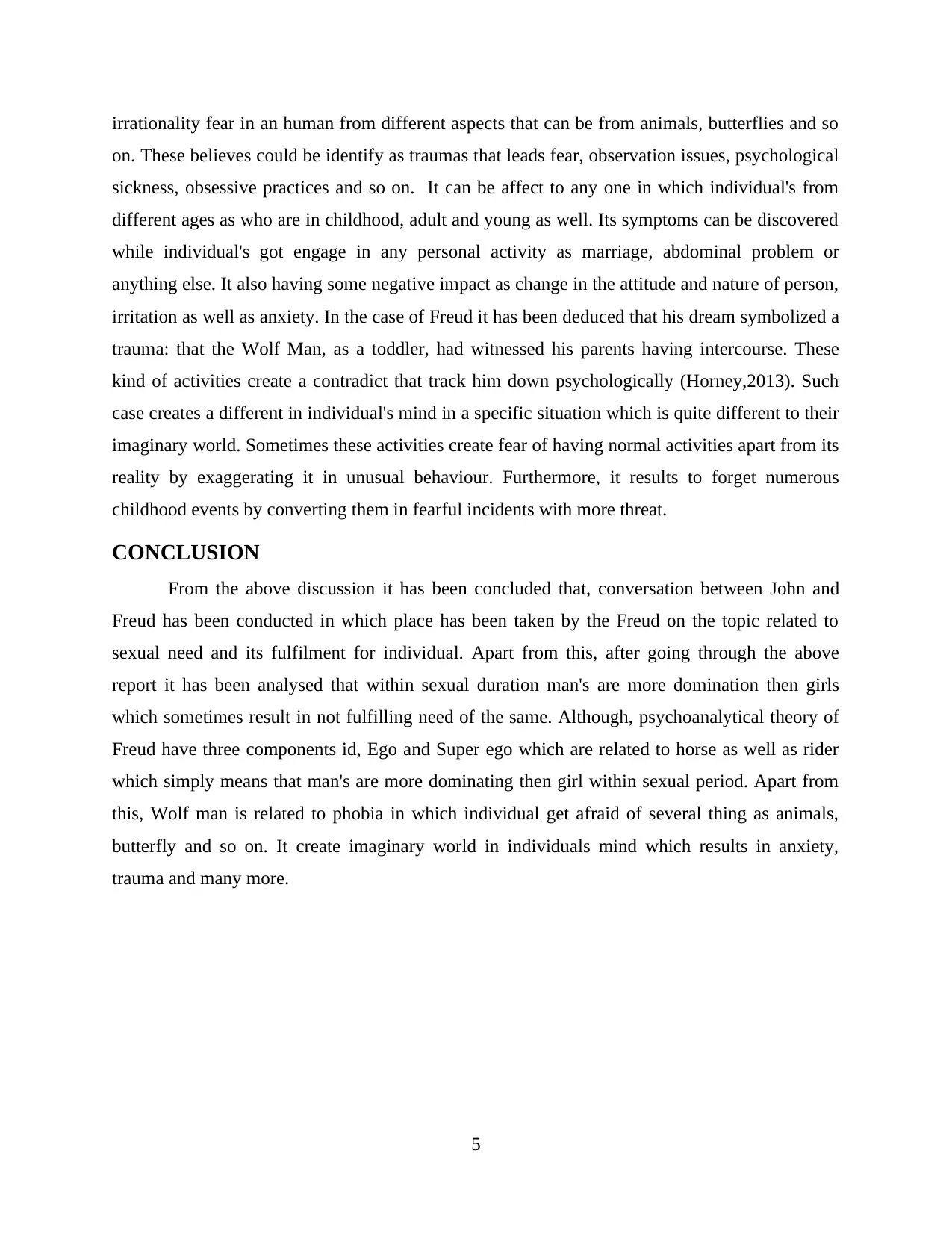
irrationality fear in an human from different aspects that can be from animals, butterflies and so
on. These believes could be identify as traumas that leads fear, observation issues, psychological
sickness, obsessive practices and so on. It can be affect to any one in which individual's from
different ages as who are in childhood, adult and young as well. Its symptoms can be discovered
while individual's got engage in any personal activity as marriage, abdominal problem or
anything else. It also having some negative impact as change in the attitude and nature of person,
irritation as well as anxiety. In the case of Freud it has been deduced that his dream symbolized a
trauma: that the Wolf Man, as a toddler, had witnessed his parents having intercourse. These
kind of activities create a contradict that track him down psychologically (Horney,2013). Such
case creates a different in individual's mind in a specific situation which is quite different to their
imaginary world. Sometimes these activities create fear of having normal activities apart from its
reality by exaggerating it in unusual behaviour. Furthermore, it results to forget numerous
childhood events by converting them in fearful incidents with more threat.
CONCLUSION
From the above discussion it has been concluded that, conversation between John and
Freud has been conducted in which place has been taken by the Freud on the topic related to
sexual need and its fulfilment for individual. Apart from this, after going through the above
report it has been analysed that within sexual duration man's are more domination then girls
which sometimes result in not fulfilling need of the same. Although, psychoanalytical theory of
Freud have three components id, Ego and Super ego which are related to horse as well as rider
which simply means that man's are more dominating then girl within sexual period. Apart from
this, Wolf man is related to phobia in which individual get afraid of several thing as animals,
butterfly and so on. It create imaginary world in individuals mind which results in anxiety,
trauma and many more.
5
on. These believes could be identify as traumas that leads fear, observation issues, psychological
sickness, obsessive practices and so on. It can be affect to any one in which individual's from
different ages as who are in childhood, adult and young as well. Its symptoms can be discovered
while individual's got engage in any personal activity as marriage, abdominal problem or
anything else. It also having some negative impact as change in the attitude and nature of person,
irritation as well as anxiety. In the case of Freud it has been deduced that his dream symbolized a
trauma: that the Wolf Man, as a toddler, had witnessed his parents having intercourse. These
kind of activities create a contradict that track him down psychologically (Horney,2013). Such
case creates a different in individual's mind in a specific situation which is quite different to their
imaginary world. Sometimes these activities create fear of having normal activities apart from its
reality by exaggerating it in unusual behaviour. Furthermore, it results to forget numerous
childhood events by converting them in fearful incidents with more threat.
CONCLUSION
From the above discussion it has been concluded that, conversation between John and
Freud has been conducted in which place has been taken by the Freud on the topic related to
sexual need and its fulfilment for individual. Apart from this, after going through the above
report it has been analysed that within sexual duration man's are more domination then girls
which sometimes result in not fulfilling need of the same. Although, psychoanalytical theory of
Freud have three components id, Ego and Super ego which are related to horse as well as rider
which simply means that man's are more dominating then girl within sexual period. Apart from
this, Wolf man is related to phobia in which individual get afraid of several thing as animals,
butterfly and so on. It create imaginary world in individuals mind which results in anxiety,
trauma and many more.
5
Paraphrase This Document
Need a fresh take? Get an instant paraphrase of this document with our AI Paraphraser
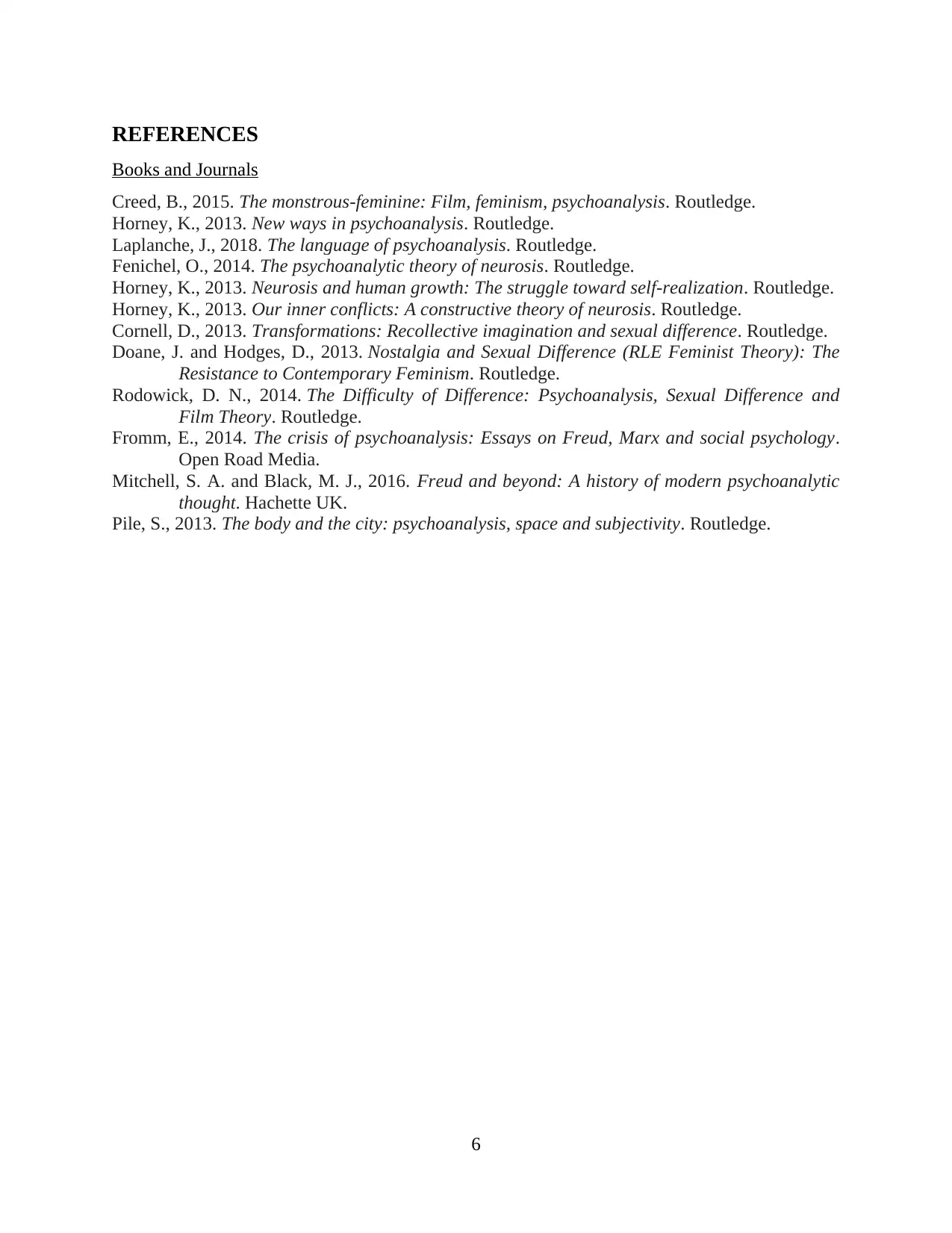
REFERENCES
Books and Journals
Creed, B., 2015. The monstrous-feminine: Film, feminism, psychoanalysis. Routledge.
Horney, K., 2013. New ways in psychoanalysis. Routledge.
Laplanche, J., 2018. The language of psychoanalysis. Routledge.
Fenichel, O., 2014. The psychoanalytic theory of neurosis. Routledge.
Horney, K., 2013. Neurosis and human growth: The struggle toward self-realization. Routledge.
Horney, K., 2013. Our inner conflicts: A constructive theory of neurosis. Routledge.
Cornell, D., 2013. Transformations: Recollective imagination and sexual difference. Routledge.
Doane, J. and Hodges, D., 2013. Nostalgia and Sexual Difference (RLE Feminist Theory): The
Resistance to Contemporary Feminism. Routledge.
Rodowick, D. N., 2014. The Difficulty of Difference: Psychoanalysis, Sexual Difference and
Film Theory. Routledge.
Fromm, E., 2014. The crisis of psychoanalysis: Essays on Freud, Marx and social psychology.
Open Road Media.
Mitchell, S. A. and Black, M. J., 2016. Freud and beyond: A history of modern psychoanalytic
thought. Hachette UK.
Pile, S., 2013. The body and the city: psychoanalysis, space and subjectivity. Routledge.
6
Books and Journals
Creed, B., 2015. The monstrous-feminine: Film, feminism, psychoanalysis. Routledge.
Horney, K., 2013. New ways in psychoanalysis. Routledge.
Laplanche, J., 2018. The language of psychoanalysis. Routledge.
Fenichel, O., 2014. The psychoanalytic theory of neurosis. Routledge.
Horney, K., 2013. Neurosis and human growth: The struggle toward self-realization. Routledge.
Horney, K., 2013. Our inner conflicts: A constructive theory of neurosis. Routledge.
Cornell, D., 2013. Transformations: Recollective imagination and sexual difference. Routledge.
Doane, J. and Hodges, D., 2013. Nostalgia and Sexual Difference (RLE Feminist Theory): The
Resistance to Contemporary Feminism. Routledge.
Rodowick, D. N., 2014. The Difficulty of Difference: Psychoanalysis, Sexual Difference and
Film Theory. Routledge.
Fromm, E., 2014. The crisis of psychoanalysis: Essays on Freud, Marx and social psychology.
Open Road Media.
Mitchell, S. A. and Black, M. J., 2016. Freud and beyond: A history of modern psychoanalytic
thought. Hachette UK.
Pile, S., 2013. The body and the city: psychoanalysis, space and subjectivity. Routledge.
6
1 out of 8
Related Documents
Your All-in-One AI-Powered Toolkit for Academic Success.
+13062052269
info@desklib.com
Available 24*7 on WhatsApp / Email
![[object Object]](/_next/static/media/star-bottom.7253800d.svg)
Unlock your academic potential
© 2024 | Zucol Services PVT LTD | All rights reserved.





